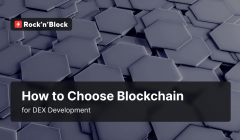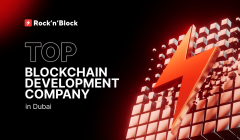The Fundamentals of Blockchain App Development
03 May 2024In the constantly evolving technology landscape, blockchain app development has emerged as a groundbreaking paradigm shift. Beyond the buzz of cryptocurrencies, blockchain technology promises to transform industries and reshape the way we interact with digital platforms. Join us on a journey into the complex realm of blockchain application development, examining its principles, applications, and innovative minds pushing the boundaries.

Table of Contents:
-
Understanding Blockchain
-
Diverse Applications of Blockchain
-
Custom Blockchain Application Development
-
Blockchain Application Development Tools and Technologies
-
Challenges and Opportunities of Blockchain App Development
-
Examples
-
Future Horizons: Emerging Technologies in Blockchain Development
-
Tomorrow’s Decentralized Experience
Understanding Blockchain
Understanding blockchain application development requires unraveling the intricate tapestry of decentralized technology. At its core, blockchain is a distributed ledger that records transactions across a network of nodes. Unlike traditional centralized systems, blockchain operates on a principle of consensus, ensuring that all participants agree on the state of the ledger.
The magic lies in its immutability: once a block of data is added, it becomes a permanent part of the chain. This essential principle guarantees transparency, security and confidence in digital transactions.
Imagine a digital record that anyone can inspect, but no one can modify - a book that transcends borders and intermediaries, fostering a new era of accountability and trust. Understanding the fundamental principles of decentralization and cryptographic security enables one to grasp the revolutionary capabilities of blockchain technology in revolutionizing industries and redefining our interaction with digital assets and information.
Diverse Applications of Blockchain

Blockchain rose to prominence with the emergence of cryptocurrencies such as Bitcoin. However, its applications extend beyond digital coins. Blockchain now serves as the foundation for various decentralized applications development (DApps) across industries such as finance, healthcare, and supply chain management. Smart contracts offer opportunities for automation and improved efficiency.
Blockchain technology has moved beyond its initial use in cryptocurrency to become a multi-faceted solution with diverse applications across industries.
Decentralized finance platforms in finance employ blockchain to create transparent and efficient alternatives to conventional banking services. Meanwhile, the supply chain management industry benefits from blockchain's ability to provide an unchangeable and traceable record. Healthcare professionals are considering the use of blockchain for secure and interoperable management of health data. Meanwhile, the art industry has adopted non-fungible tokens development (NFTs) for tracking ownership and provenance on the blockchain.
Custom Blockchain Application Development
As each business is unique, it often happens that off-the-shelf solutions do not meet specific business requirements. Custom blockchain application development is of the utmost importance, as it enables bespoke solutions that are precisely designed to meet the individual needs and objectives of the business. The primary benefit is its ability to address unique business requirements that are not fully met by pre-built solutions. Custom blockchain development enables companies to shape blockchain specifically for their processes, ensuring optimal efficiency and integration with existing systems. Additionally, organizations can include sophisticated features such as specialized consensus mechanisms, governance models, and smart contract development, aligning the blockchain exactly with their operational needs. Security is a crucial consideration as bespoke solutions empower companies to implement strong security measures that match their risk profiles.
Though off-the-shelf solutions provide a quick start, custom blockchain app development ensures long-term scalability, adaptability and competitive advantage by developing alongside the evolving needs of the business. Ultimately, the choice of a custom blockchain app development reflects a strategic commitment to innovation, efficiency, and a nuanced approach to blockchain integration tailored to the specific demands of the business.
Explore the world of possibilities with confidence, let's build your unique blockchain software together!
Blockchain Application Development Tools and Technologies
Blockchain app development is a complex and dynamic process that necessitates a sophisticated set of tools and technologies. In the ever-evolving ecosystem of decentralized applications, developers navigate a diverse technological tapestry to bring their innovative ideas to life. This section examines the crucial tools and technologies that shape the world of blockchain app development, from the fundamental platforms to the intricate programming languages that are used in smart contract development.

The Foundation: Platforms for Blockchain Development
Blockchain application development typically starts with selecting a suitable platform. Ethereum, being one of the pioneers, offers a robust and widely adopted ecosystem, while platforms such as Binance Smart Chain and Hyperledger offer alternatives tailored to specific needs. Every platform brings its own merits, scalability choices, and consensus mechanisms, which enable developers to choose the most fitting foundation for decentralized applications.
Smart Contract Languages
Smart contracts development is at the core of many blockchain applications, functioning as self-executing agreements with predefined rules coded into them. Solidity, which was widely adopted on Ethereum, is a commonly used language for smart contracts development. Nevertheless, the field is broadening with languages such as Rust (used in the Polkadot ecosystem) and Chaincode (for Hyperledger Fabric) giving developers a wider array of tools to securely incorporate complex business logic.
Integrated Development Environments (IDEs)
To simplify the development process, integrated development environments (IDEs) tailored for blockchain development come into play. Examples include Remix and Truffle, which cater specifically to Ethereum and EVM networks. Their features include tools for smart contract compilation, debugging, and deployment. These IDEs make the coding process easier, allowing developers to focus on the creative aspects of their blockchain applications development without getting bogged down in the complexities of the underlying technology.
Navigating the Blockchain Explorer Tools
Blockchain explorer tools provide a transparent window into the nature of the blockchain. They empower developers and users to explore and authenticate transactions, smart contracts, and the network's overall condition. Etherscan is a prime example of Ethereum's blockchain explorer tool, while BscScan represents Binance Smart Chain. There are also tools for blockchain explorer development which provide infrastructure and code base, allowing anyone to inspect, modify, deploy your own blockchain explorer and contribute to the development. For example, Blockscout.
These essential tools play a significant role in debugging, auditing, and ensuring transaction integrity throughout the blockchain.
Testing and Auditing Tools
The security of blockchain is of utmost importance, considering its decentralized and tamper-proof nature. To ensure the security of smart contracts, blockchain developers can use testing and auditing tools such as MythX and Securify for Ethereum and Oyente for Bitcoin to identify vulnerabilities prior to deployment.
Frameworks for Blockchain Development
Frameworks offer a well-organized method for constructing decentralized applications. OpenZeppelin, for example, provides an extensive framework for Ethereum, streamlining the generation of secure and upgradable smart contracts. These frameworks embody best practices and standardize smart contract development processes, enabling developers to build efficiently and securely.
Challenges and Opportunities of Blockchain App Development
Despite its transformative potential, blockchain app development presents its own set of challenges.

-
Balancing Speed and Decentralization
One of the main challenges in blockchain app development is scalability. While the decentralized nature of blockchain technology guarantees security and transparency, it can often result in reduced transaction speeds. To achieve mass adoption, developers must strike a delicate balance between decentralization and transaction throughput. Layer 2 solutions and technological advances, such as sharding, are aimed at resolving issues related to scalability, presenting a chance to instigate a modern era of decentralized apps that are quicker and more effective.
-
Interoperability
Interoperability poses a significant challenge as blockchain networks often function in isolation, given the fragmented nature of the ecosystem. Bridging blockchain networks is the goal of solutions such as Polkadot and Cosmos. By doing so, developers can create interconnected applications that capitalize on the advantages of multiple networks.
-
Regulatory Compliance
The regulatory environment, which encompasses the sphere of blockchain and cryptocurrencies, displays dynamic variability globally. For blockchain developers, navigating this complex landscape is a challenge, as they must comply with existing regulations while pushing the boundaries of decentralized innovation. Governments are currently seeking to comprehend and regulate blockchain technology. This presents a chance for the industry and policymakers to work together and develop a well-defined framework that fosters blockchain applications development innovation, while ensuring consumer protection and security.
-
User Experience
Blockchain software development can be challenging in providing a seamless user experience due to complex wallet configurations and the requirement for users to manage private keys during the onboarding process, which can be a barrier to wider adoption. However, blockchain app developers can seize this challenge as an opportunity to create more intuitive interfaces, user-friendly wallets, and educational resources that empower users to engage with blockchain applications without encountering a significant learning barrier.
-
Security Imperatives
While blockchain development is renowned for its security features, the decentralized nature of applications can also expose vulnerabilities. Smart contract bugs, hacking attempts, and exploits are constant concerns for developers. However, these challenges present opportunities for security-focused innovation. Tools and platforms for auditing smart contracts, secure coding practices, and decentralized identity solutions contribute to fortifying the blockchain ecosystem against evolving threats.
-
Economic Models
The economic sustainability of decentralized applications development introduces both challenges and opportunities. The traditional monetization models may not seamlessly translate into decentralized ecosystems. Blockchain developers must explore tokenomics, decentralized finance landscape, and innovative incentive structures to ensure the economic viability of their projects. This will pave the way for unique methods of financing and preserving blockchain application development through tokenized economies and community-driven initiatives.
-
Environmental Impact
The energy consumption associated with certain consensus mechanisms, such as Proof of Work (PoW), has raised environmental concerns. Blockchain app developers face the challenge of finding more sustainable alternatives, such as Proof of Stake (PoS) or newer consensus mechanisms. This shift not only addresses environmental concerns but also presents an opportunity to enhance the overall efficiency and sustainability of blockchain networks.
The challenges and opportunities of blockchain software development generate a dynamic environment in which developers must navigate the ever-changing tides of technology, regulation, and user expectations. Though scalability, interoperability, and security risks present daunting obstacles, they also inspire creativity, driving the creation of blockchain solutions that challenge the limits of decentralized software. As the blockchain industry advances, developers have a significant impact on the shaping of the sector's future. They leverage challenges as opportunities to construct more robust, user-friendly, and sustainable decentralized ecosystems.
Examples
Blockchain app development has overcome its initial association with cryptocurrencies and now offers transformative solutions across a variety of industries. Let’s examine specific instances illustrating how blockchain app development is not just a theoretical concept but a practical tool that is redefining how we conduct business, secure data, and interact with digital assets.

Finance: DeFi Platforms
The financial sector has experienced a major change due to the emergence of DeFi platforms development. These applications utilize blockchain technology to remove the requirement for conventional brokers, providing users with direct access to financial services like borrowing, lending, and trading from their digital wallets. Platforms such as Compound and Aave serve as prime examples of how blockchain app development is enhancing financial democracy by granting users borderless, transparent, and permissionless access to numerous financial instruments.
Supply Chain Management
Blockchain's transparent and immutable ledger is transforming supply chain management, providing unparalleled levels of transparency and traceability. Utilizing blockchain technology, businesses are able to monitor the journey of products from the manufacturer to the end consumer. For example, the Food Trust platform developed by IBM employs blockchain development to trace the origin and journey of food products, ensuring food safety, preventing fraud, and improving overall supply chain efficiency.
Healthcare
Blockchain app development is gaining ground in the healthcare sector by addressing the challenges of secure and interoperable management of health data. Platforms such as MedRec employ blockchain development to empower patients with the ability to regulate their health records, ensuring confidentiality and hassle-free sharing of information among healthcare providers. This not only improves data security but also optimizes healthcare processes, privileging a patient-centric model.
Art and Entertainment
NFT marketplace development has recently gained widespread attention in the world of art and entertainment, showcasing the versatility of blockchain technology. NFTs, which indicate ownership of exclusive digital assets, are commonly used to tokenize digital art, music and virtual real estate. Platforms such as OpenSea and Rarible allow artists to directly monetize their creations, establishing a decentralized marketplace for digital assets and altering the traditional art and entertainment industry.
LegalTech
The legal sector is increasingly adopting blockchain software development through the implementation of smart contracts. The contracts automate and enforce agreements, thereby reducing the need for intermediaries. Platforms such as OpenLaw demonstrate how smart contracts development can enhance legal processes by increasing efficiency and reducing costs, covering everything from basic agreements to intricate contractual relationships.
Gaming: Decentralized Virtual Economies
Blockchain app development is transforming the gaming industry by introducing decentralized virtual economies. Games such as Decentraland and Axie Infinity use blockchain technology to allow players to truly own and trade in-game assets. This move towards player ownership of digital assets not only creates new revenue streams for gamers but also poses a challenge to conventional gaming models, providing a more inclusive and participatory gaming experience.
Real Estate
The real estate sector is currently undergoing a significant change through the assets tokenization on a blockchain. Platforms such as Harbor and RealT enable fractional real estate ownership using blockchain tokens. This offers greater access to real estate investments, allowing individuals to invest in and trade property assets with remarkable liquidity and efficiency.
Social Impact
Blockchain app development serves a dual purpose of social impact and business potential. Charitable endeavors such as GiveDirectly and UNICEF's Project Connect harness the potential of blockchain development for seamless and transparent distribution of funds and resources. Moreover, blockchain's innate features of accountability and transparency ensure the effective and secure allocation of resources to their intended recipients through verifiable channels.
Overall, the showcased examples demonstrate the actual influence of blockchain app development amongst various industries. Looking beyond superficial claims, blockchain is acting as an instigator of creativity, offering pragmatic solutions to longstanding obstacles. With the persistent evolution of these applications, the capacity for blockchain app development to redefine sectors, posit empowerment among individuals, and institute affirmative social changes are becoming more apparent.
Emerging Technologies in Blockchain Development
As the evolution of blockchain app development progresses, the future brings exciting opportunities. Integration with cutting-edge technologies like artificial intelligence and the Internet of Things (IoT) will unlock new levels of innovation.
Polkadot and Cosmos' interoperability solutions strive to interconnect distinct blockchain networks, cultivating a more interconnected digital landscape. Layer 2 solutions, specifically Optimistic Rollups and zk-Rollups, address challenges in scalability by promising faster and more cost-effective transactions.
DeFi development is expected to expand its influence, disrupting traditional financial systems and providing a wider range of financial services to a global audience. Furthermore, the continued investigation into sustainable consensus mechanisms will address environmental concerns related to blockchain, contributing to a more environmentally conscious and socially responsible landscape for development. The potential of blockchain app development is vast, as developers, industries and users work together to create a decentralized, transparent and inclusive digital future.
Tomorrow’s Decentralized Experience
The realm of blockchain app development is a multifaceted and thrilling world, where developers use a variety of tools and technologies to create the decentralized experiences of tomorrow. The correct platform selection, smart contract development, and navigating intricate security infrastructures are vital components that define the way dApps will be built in the future.
As technology increasingly matures, developers are at the forefront of innovation, exploring new tools, frameworks and horizons to push the boundaries of what's possible in the ever-expanding realm of blockchain app development.
The possibilities are endless for those who dare to dream beyond the ordinary. Our company welcomes the vast potential of blockchain software development and is always willing to help you transform your vision into innovative, bespoke solutions. We offer diverse tools and our expertise to craft your ideas into meticulously designed products that meet your specific goals and objectives.
We ❤️ Development
Follow us on social media to receive the hottest blockchain development updates
Crunchbase ⚡️ Twitter ⚡️ Telegram ⚡️ LinkedIn ⚡️ Facebook ⚡️ Zupyak ⚡️ Quora ⚡️ Reddit







